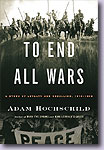

To End All Wars: A Story of Loyalty and Rebellion,
1914-1918
Adam Hochschild�s To End All Wars is a seminal, compelling narrative about the Great War. As in all of
Hochschild�s previous books, the writing is rich, luminous, uncompromisingly researched, and compassionate. If
each of us is complicated�and we are�the characters in To End All Wars seem worthy of Shakespeare�s King Lear
and Hochschild�s writing, at its best, interprets the world with the perspicuity of Anton Chekhov�s finest stories.
Integrating the complicated lives of the war�s generals, Sir James French and Douglas Haig, and the narratives
of courageous anti-war protestors like Charlotte Despard, Stephen Hobhouse, and Sylvia Pankhurst, Hochschild
provides a trenchant analysis of what the Great War did to Britain, to its families, and to world history. For
as Hochschild shows, the Great War helped precipitate Stalinism, World War II, and the Holocaust. And it was
also the beginning, sadly, of new-fangled machines of destruction, of a time when, as Hochschild writes, �the
magnetic attraction of combat, or at least the belief that it was patriotic and necessary, proved so much stronger
than revulsion at mass death.�
All who think and write about war hearken brought back to the famous poem, �The Charge of the Light Brigade,�
with its brutal depiction of wartime misconduct; but the Great War, as Hochschild shows, provides examples of
command ineptitude and arrogance unparalleled in battlefield experience. Generals French and Haig were, to put
it kindly, self-righteous fools, willing to kill hundreds of thousands of men to abet their egos. Hochschild�s
detailing of their willful disregard of the truths of modern warfare, their inability to understand what a machine
gun and barbed wire might do to an army of ill-protected infantry, all of this is hard to fathom. And yet one
million men died because of such misguided vanity. Hochschild�s descriptions of the Battle of Somme, with its
mind-numbing litany of human savagery, is one of the most powerful and painful in memory, and yet this is only
the first day:
Of the 120,000 British Troops who went into battle on July 1, 1916, more than 57,000
were dead or wounded before the day was over�nearly two casualties for every yard of
the front. Nineteen thousand were killed, most of them within the attack�s first disastrous
hour, and some 2,000 more who were badly wounded would die in hospitals later. There
were an estimated 8,000 German casualties. As usual, the toll was heaviest among the
officers. Three-quarters of whom were killed or wounded.
How men could advance against machine guns, die in plague-like numbers, and still soldier on is at the center of
the book � and yet it is to Hochschild�s credit that we can understand how an army, and a world, can seemingly go
insane. And as Hochschild reminds, this was a war where the upper classes died in extraordinary numbers � a war
where nearly one third of the eligible males in Britain were killed.
And yet if war is undeniable folly, not all men and women charge madly to its call. Hochschild brilliantly describes
those who chose the path of war resistance and pacifism, including Sylvia Pankhurst, whose courage rivals that
of Sojourner Truth. Hochschild writes sympathetically of the famous philosopher Bertrand Russell who fights the
dangers of jingoism and warmongering with a nearly incomprehensible output of well-reasoned treatises. It is he,
in a deft program of political persuasion, who saves a group of pacifists from execution. And there is also the
poignant narrative of Stephen Hobhouse who, though sentenced to solitary confinement, dared to speak to his fellow
prisoners, even though it was not permitted. Hobhouse�s Quaker beliefs necessitated that he must speak to others,
for his acknowledgment of their humanity was tantamount to celebrating God�s presence in each of us. For him, there
was no subterfuge permitted in his actions � he would openly oppose evil.
In one of the most beautiful passages in To End All Wars, in the middle of the Somme stalemate, amongst the horrible
litany of death and dying, the German and British troops meet for an �improvised Christmas truce,� playing soccer,
singing carols, even cutting one another�s hair. As Hochchild writes �Later in the day, a German juggler who had
been onstage in London before the war gave a bravura performance; soldiers from both sides chased and caught hares
running between the trenches. Men from the Cheshire Regiment slaughtered a pig, cooked it in no man�s land, and
shared it with the Germans, and some Saxon troops rolled a barrel of beer over their parapet and into eager British
hands.�
I can�t do justice to this superb book in this short pr�cis. I can only thank Adam Hochschild for writing it. When
the Great War propagandist and jingoist Rudyard Kipling�s son dies in the war, Kipling and his wife Carrie, like
any father and mother, became distraught. However grand Kipling�s paeans to the war effort, his loss is unendurable,
and Hochschild makes us confront every parent�s worst fear. As Hochschild knows, we may fight in numbers, but we
grieve alone.
As the world is presently engaged in numerous wars (be they in Afghanistan, Syria, or Darfur), To End All Wars
becomes indispensable. Please read it, and please work towards peace.
-Ken McClane, 2012 finalist judge
|